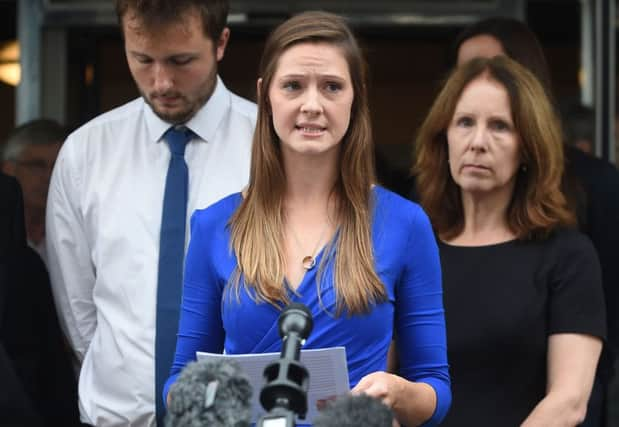Army ‘sorry’ for three deaths on SAS test march


An inquest into the heat-related collapse of reservists James Dunsby, Edward Maher and Craig Roberts concluded they would have survived if commanders had followed Ministry of Defence guidelines.
Narrative verdicts recorded by Birmingham coroner Louise Hunt also found that delays in providing medical help to the men amounted to neglect.
Advertisement
Hide AdAdvertisement
Hide AdA 20-day inquest heard directing staff took almost two hours to notice Lance Corporal Maher had stopped moving during the exercise, a 16-mile march in “heatwave” conditions in the Brecon Beacons. After the coroner ruled the SAS hopefuls died as a result of organisational and management failures, Corporal Dunsby’s widow accused the MoD of a lack of humility.
Bryher Dunsby said: “There have been times during the course of this inquest when the Ministry of Defence has lost sight of the importance of their very own values and standards.
“They displayed no responsibility, no accountability and no humility for their role in creating the culture which led to the events of the 13th of July 2013.”
Speaking outside the inquest in Solihull, Mrs Dunsby added: “James would have been so hugely disappointed by the behaviour of an organisation for which he had fought and to which he ultimately lost his life.
“The evidence in this inquiry has revealed a list of countless and quite honestly embarrassing failings which anyone with pride in our armed forces would find to be shocking and unacceptable.”
Recording her verdicts, the coroner ruled that inadequate supplies of water also contributed to the death of L/Cpl Maher.
Lance corporals Maher and Roberts were pronounced dead on the hillside in the final stages of the march, which had a target time of eight hours and 48 minutes. Cpl Dunsby died in hospital two weeks later.
Criticising the “chaotic” response to the men’s collapse and accusing special forces commanders of a catalogue of serious mistakes, Ms Hunt said: “The risk assessment undertaken for this exercise was inadequate.
Advertisement
Hide AdAdvertisement
Hide Ad“There was a failure to implement an adequate medical plan to allow for treatment of any heat-illness casualties.”
Claiming there had been a failure to learn from a previous fatality on a test march in 2008, Ms Hunt added: “There was a culture of following what had gone before without giving any consideration to specific risks.
“The (special forces) signals regiment took their lead from, and was subservient to, the lead regular unit. They do not think for themselves.”
Brigadier John Donnelly, the army’s personnel director, said: “I would like to apologise for the deaths of James Dunsby, Craig Roberts and Edward Maher, three fine soldiers, and I would like to offer my sincere condolences to their families and friends who have shown great dignity during what has been a very difficult period.
“We are truly sorry for all the mistakes which the coroner identified.”